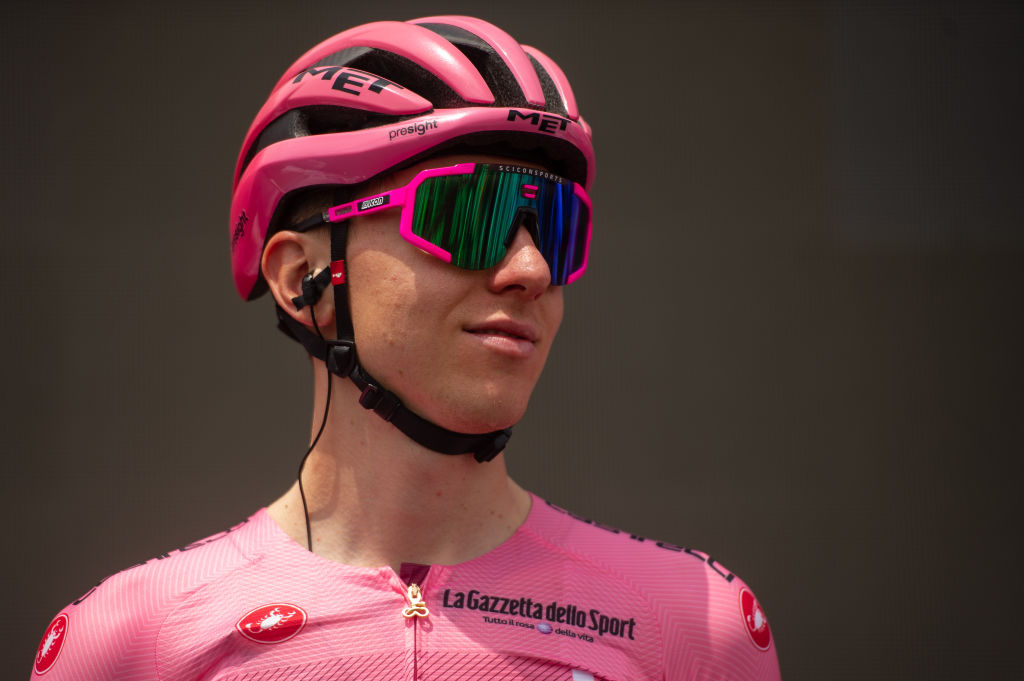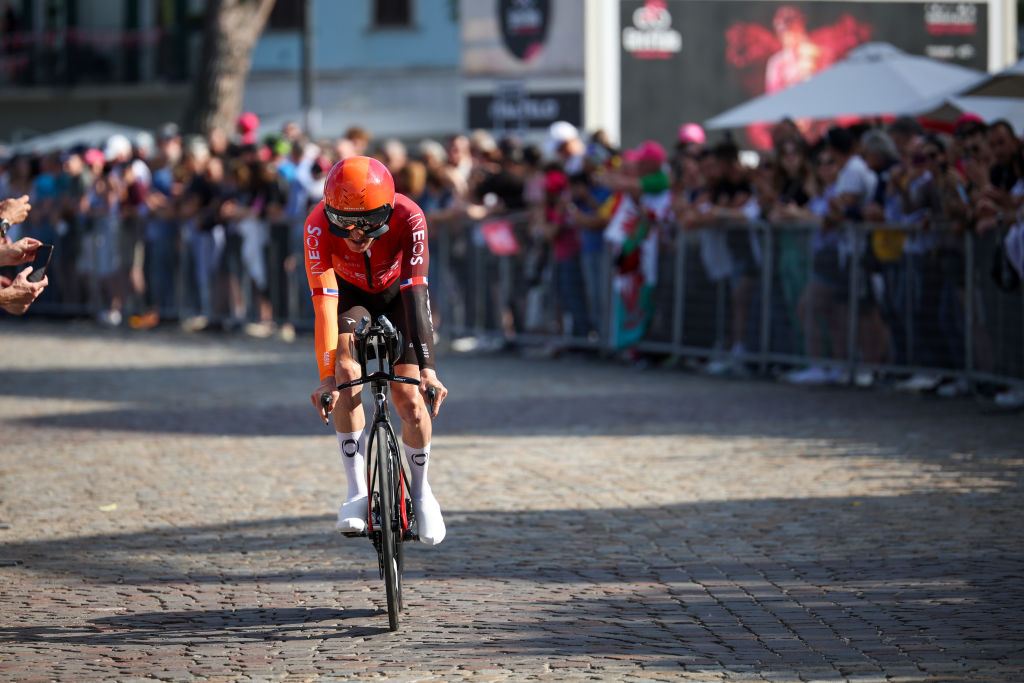In a race of his own – Tadej Pogačar puts Giro d'Italia further and further out of reach
Slovenian gains again in time trial and eyes another stage win at Livigno

How many times can one rider keep on winning the same bike race? Tadej Pogačar’s inexorable march towards Giro d’Italia victory continued on Saturday as he landed yet another blow on his putative rivals in the stage 14 time trial to Desenzano del Garda.
After his victory in the Perugia time trial last week – and maybe even after the summit finish at Oropa on stage 2 – it was already tempting to declare this Giro over as a contest. On the shores of Lake Garda on Saturday afternoon, Pogačar simply repeated the dose. A race that was already beyond the reach of the rest save for injury or illness to the maglia rosa has now moved even further from their grasp.
Although he had to settle for second on the stage, 29 seconds down on Filippo Ganna (Ineos), Pogačar proceeded to put more than half a minute into everybody else in a discipline that had supposedly become a weak point over the past couple of years. The thought seems absurd now.
Before this Giro began, some observers reckoned that Geraint Thomas (Ineos) might break roughly even with Pogačar across the two time trials. Instead, the Welshman came away from stage 14 pleased simply to have limited the damage to 45 seconds – or more accurately, glad to have picked up time on the other podium contenders.
As Pogačar disappears ever further into the distance, Thomas et al have basically stopped using the UAE Team Emirates rider as a reference point. Pogačar isn’t just competing in a different race to the rest; at times, it looks like an entirely different sport.
In the overall standings, Pogačar’s lead now stands 3:41 over Thomas and 3:56 on Daniel Martínez (Bora-Hansgrohe), with Ben O’Connor (Decathlon-AG2R) 4:35 down in fifth. His advantage after 14 stages is bigger than anybody has managed across the whole race since Vincenzo Nibali’s dominant 2013 performance, when he won by 4:43 in Milan.
At this rate, and with so many mountain passes still to come, Pogačar could even, if the fancy took him, come close to Ivan Basso’s 21st century record of 9:18, established in 2006 shortly before the tentacles of Operación Puerto closed in on him.
Get The Leadout Newsletter
The latest race content, interviews, features, reviews and expert buying guides, direct to your inbox!
“The real Giro started today,” Pogačar insisted in the mixed zone on Saturday afternoon, a sobering thought for those who felt the race had already ended as a contest a week ago.
And even as Pogačar looked to strike a cautious note, it was telling that he namechecked the elements rather than his rivals as he cast about for potential hazards between here and Rome. “It’s not wrapped up. Let’s not discount anything,” Pogačar said. “Today I gained time, but you never know what happens in the mountains – rain, snow, whatever.”
An act of god is the biggest threat to his pink jersey, in other words.
Livigno and the podium race

While Pogačar took another firm stride clear of the field, the pack behind him continues to jostle for position. Thomas’ solid display – 4th at 1:14 – sees him leapfrog Martínez in the overall standings and move into second place. Martínez’s relatively subdued showing was a mild surprise after his performance in Perugia, but in truth, there seems to be precious little to choose between the riders vying for the places behind Pogačar.
To illustrate the point, O’Connor and Antonio Tiberi (Bahrain Victorious), fourth and fifth overall, effectively broke even in the 31km test. Tiberi was six seconds quicker than the Australian, but both men came away satisfied with their showings – and they will both feel quietly confident about their chances of moving into the podium berths by Rome. Behind the seemingly inevitable Pogačar procession, a spirited bike race might yet break out in the final week.
Sunday’s tappone to Livigno should reveal more. The 222km stage features some 5,300m of climbing, earning the tag of “monstrous” from Pogačar himself. The climbs of the Colle San Zeno and the Mortirolo are followed by an interminable, two-part haul towards the finish in Livigno via the category 1 ascents of the Passo di Foscagno and the Passo di Eira.
The change in register from a flat time trial, run off at over 50kph, to a long slog through the mountains will be a brutal one. After pushing mammoth gears in warm, early summer sunshine on Saturday afternoon, the gruppo will be battling sharp gradients and single-digit temperatures in the final hour on stage 15. Inevitably, somebody will struggle to manage the transition and pay an accordingly heavy price.
Past the finish line in Desenzano, O’Connor smiled when asked if the Livigno stage had been in the back of his mind during the time trial. “No,” he said. “But it will be in the front of my mind tonight.” The terrible beauty of the Giro is that it strings such disparate tests together, one after the other.
One man, however, continues to look impervious to its demands. On the podium on Saturday afternoon, Pogačar declined the usual entreaties to toss his bouquet to the crowds below, preferring instead to save the flowers for his girlfriend Urska Zigart of Jayco-Alula, who was visiting the Giro in the company of his agent Alex Carera.
After sharing the pie, per his expression, with the rest of the peloton in the second week of the Giro, Pogačar seems unlikely to throw any gifts to the wind on stage 15 either. The roads are familiar from his regular residencies at Livigno, and motivation won’t be lacking. “Our plan will be probably quite simple,” Pogačar said. “It’s a queen stage, we probably want to go for the stage.”
Pogačar claimed on Saturday that the knock-out blow of this Giro wouldn’t be landed until the penultimate day in Bassano del Grappa. Perhaps, but his lead on the scorecard is insurmountable and nobody looks like laying a glove on him in the meantime.

Barry Ryan was Head of Features at Cyclingnews. He has covered professional cycling since 2010, reporting from the Tour de France, Giro d’Italia and events from Argentina to Japan. His writing has appeared in The Independent, Procycling and Cycling Plus. He is the author of The Ascent: Sean Kelly, Stephen Roche and the Rise of Irish Cycling’s Golden Generation, published by Gill Books.